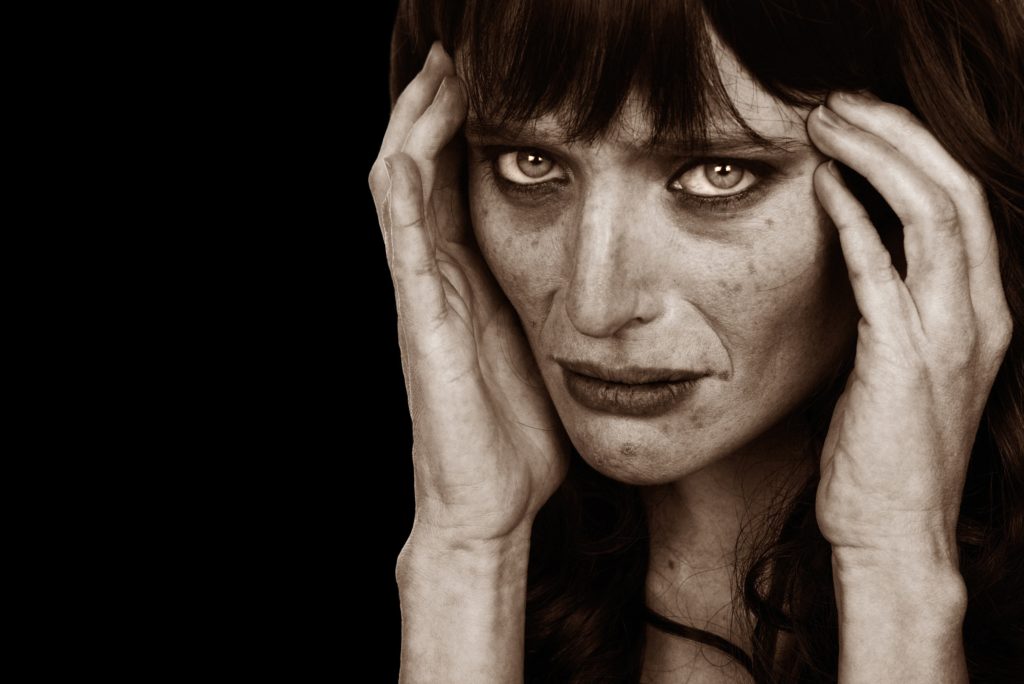Lorelie Rozzano is a guest blogger for Vertava Health.
Addiction Lied To Me In The Scariest Voice Of All – My Own
— It was winter’s eve of 97. Snow was falling as I looked for a safe place to sleep that night. I turned into an alleyway behind a furniture store and saw an off-ramp where trucks unloaded large appliances. Underneath the ramp was a small dry space. I crawled into the tiny cubby-hole claiming it as my own. I leaned against the hard spiny wall preparing my daily ritual. From my front pocket, I pulled out my pipe and lighter. I held the glass bowl between my stiff fingers, stroking it lovingly. Then I lit up and got down to business. I ran the blue flame around the bowl, again and again, taking in large lungfuls of hot, bitter ash. I blew out yesterday’s smoke and cried. In spite of wishing it weren’t so, there was nothing in the bowl. Not a single crumb remained. I would not be getting high that night. Without the numbing buffer of drugs, reality set in. How did I get here? Where did I go wrong? To answer that question I must go back. My father was an alcoholic. The attention I received from him was framed within a negative context. It seemed I was always doing something wrong. I didn’t look right, I was too loud, my room was a mess. I was compared to other kids and somehow, I never did measure up. Although I didn’t know it then, those messages would stay with me for a long time. The first time I tried alcohol and drugs, my whole world changed. They provided me the comfort, courage and self-esteem that I had missed in my home growing up. Going forward, I built a lifestyle around them. [lorelie-callout] I didn’t realize that comfort came with such a deadly price. Or that addiction feeds on emotional, physical and psychological pain. Abusing substance changed the part of my brain responsible for impulse control. I was not thinking clearly. As I continued to act irrationally, denial set in. Instead of admitting and facing my problems, I made excuses for them. I began doing things I said I’d never do. I pawned precious heirlooms, I wrote fraudulent checks and I stole money from my children’s piggy bank. I told myself I’d make it up. I’d get it all back. On my next payday, I’d get the heirlooms out of pawn, repay my children’s piggy bank and never write another bad check again. In spite of my good intentions, it never played out the way. My need for drugs was just too compelling. As my world continued to shrink and deteriorate, I told myself it wasn’t that bad. I still had a roof over my head, a job and I wasn’t sticking needles in my arm. However, I stopped noticing my family. I was entirely self-absorbed. Feeding my addiction became a full-time job. I was not formulating thoughts in the area of my brain responsible for reasoning and logic. My reptilian brain had taken over. The reptilian brain is the command center for survival instinct – the “fight or flight” response. When scared and dope-sick, your physiology changes, causing blood to go to the body parts you need for survival – muscles, heart, lungs, adrenal glands and the brain. This means all conscious brain activity is re-routed to your reptilian brain while the action in your frontal brain- the thinking and feeling parts- shuts down. The voice in my head was saying, “get dope or die!” I lost a lot of weight. I was a skeleton with grey skin and sunken eyes. My teeth were rotting and my hair was falling out. And still, I thought I had it under control. The sad truth was, addiction lied to me in the scariest voice of all – my own. I was sick, delusional and out of my mind. Since getting clean and sober, I’ve been baffled by my own ideology. Why do we think it’s helpful, compassionate even, to allow people who have lost the ability to fight for their life, the responsibility of making life and death choices? We wait for those suffering from addiction to hit rock bottom, to reach out for help and to come to their senses. But sanity is not magically restored to hopeless individuals who have lost the will to live. People don’t get better over time, they just get sicker and many will die. When those suffering from addiction lose the ability to fight for their lives, I believe we must step in and help them. Handing out clean needles and Narcan is a start, but it can’t stop here. Instead, when someone survives an overdose, they shouldn’t be discharged without a treatment team in place. The criminal justice system needs to encourage drug and alcohol offenders to seek help through drug court programs as a condition of pretrial release, probation or parole. States and provinces across North America must be allowed to adopt mandated treatment policies for individuals who are dying from addiction if we want to save lives. All is not grim. There is hope. Addiction is a highly treatable illness. Today there are 23 million people just like me who are living in recovery. If you’ve lost your way or love someone who has, reach out for help. To start your new life all you have to do is pick up the phone and call the number below. If you or someone you know needs help, please call this confidential support line for assistance 844-470-0410.


